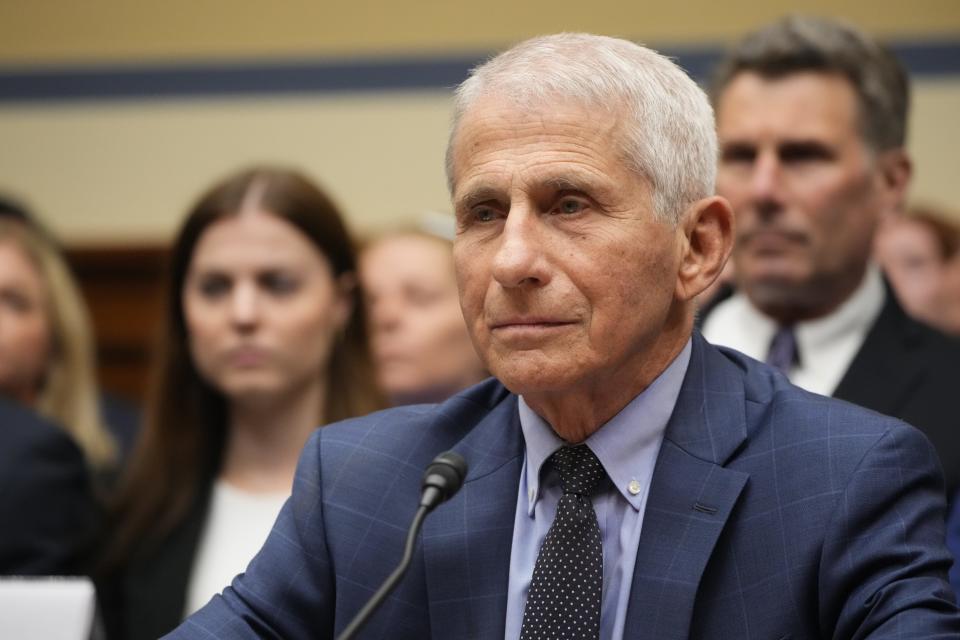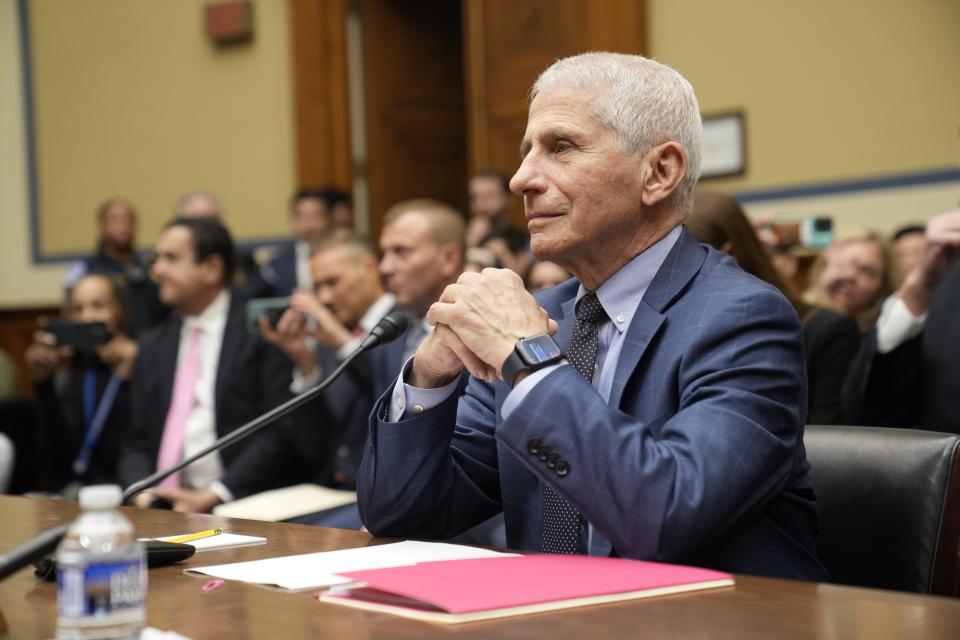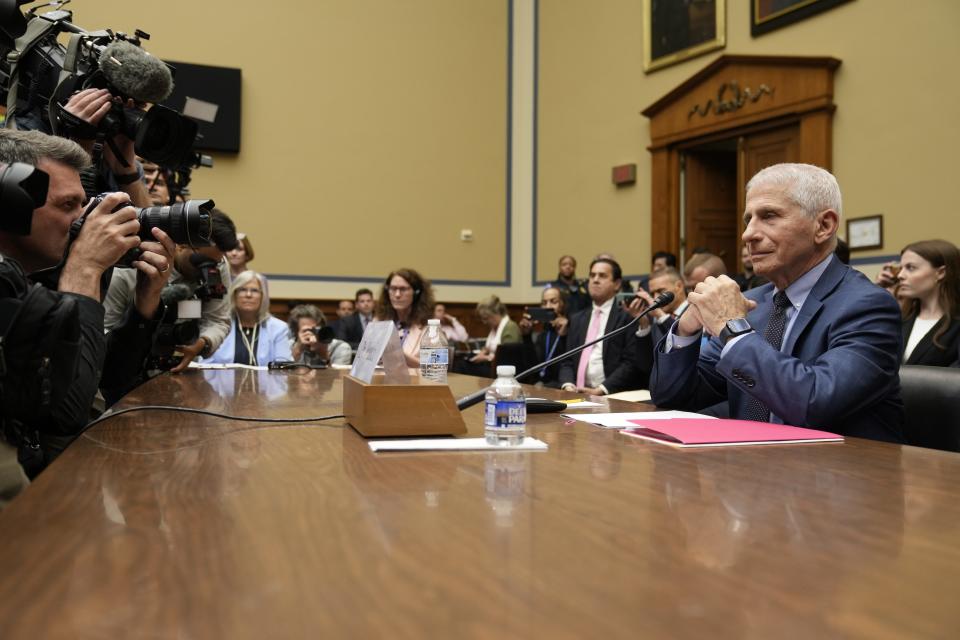Anthony Fauci faces questions during contentious COVID-19 hearing in the House
During a contentious hearing Monday on Capitol Hill, Dr. Anthony Fauci defended himself against vague accusations of helping fund Chinese government efforts to create the COVID-19 virus, hiding medical data about the pandemic and making up U.S. guidelines that kept people 6 feet apart during the height of the pandemic.
Fauci, who said none of that was true, has become a focus of anger and frustration for his stands on vaccination, science and social distancing – the same qualities that make him highly admired by others.
He remained calm during the more than three-hour hearing, outlining the threats that he, his wife and his three daughters have received over the course of the pandemic, including death threats.
"There have been credible death threats leading to the arrests of two individuals and credible death threats means someone who clearly was on their way to kill me," Fauci said.
He appeared voluntarily at Monday's hearing of the House Committee on Oversight and Accountability, as he has a number of other times he has been called before Congress to discuss COVID-19.

Fauci said widespread threats against public health workers during and after the pandemic have robbed America of some “very good talent,” young people who might have gone into public health but now chose not to. “They’re reluctant to put themselves and their families through what they see us going through,” he said.
Several Republican representatives questioned Fauci about the $120,000 grant his agency provided through another organization to China’s Wuhan Institute of Virology. If the virus that causes COVID-19 originated in a lab, that lab was most likely at the Wuhan Institute, which had an annual budget of $6 billion. "If they were going to do something on the side, then they would have had plenty of money to do it," Fauci said.
But it is not biologically possible for the money his agency provided to have led to the creation of the SARS-CoV-2 virus, Fauci testified. Even if the virus came out of the Wuhan lab, it had to have come from a different virus than the one the U.S. money supported, he said.
“The viruses were phylogenetically so far removed from SARS‑CoV‑2 virus that it’s molecularly impossible for those viruses to have evolved into SARS-CoV-2 virus,” he said. “It’s just a biological fact.”
He also vigorously denied that he had somehow “bribed” scientists to change their stance on the origins of the virus by offering millions of dollars in grant money, calling the accusation “simply preposterous.”
The Republicans on the committee have spent 15 months looking for information suggesting Fauci behaved improperly during the COVID-19 pandemic, which Democrats on the committee said they had failed to find.
“We haven’t seen a damned thing to suggest that these accusations are accurate,” said Rep. Kweisi Mfume, R-Md.
Another topic was the Committee's release on Friday of information about two of Fauci's former employees, Dr. David Morens and Greg Folkers, whose emails during the pandemic appear to show they were trying to avoid federal transparency laws and also circumvent Freedom of Information Act requests, in part by using personal email.
Fauci said multiple times that he "knew nothing" of these attempts and that he had never knowingly used his personal email for his official position. "I knew nothing of Dr. Morens' actions," he said.

A number of Republicans mentioned COVID-19 guidelines meant to slow the spread of the virus and the ways in which they disrupted life ‒ and were rejected by and infuriated many Americans. Fauci said the guidelines represented the best-known information at a time when faced with a virus no one had ever seen before.
But the American public didn’t get to see the scientific data to support the guidelines, said Dr. Richard McCormick, R-Ga.
“Americans were aggressively bullied, shamed and silenced for debating issues such as social distancing, masks, vaccines or the origins of COVID,” he said. “Americans do not hate science, but Americans know hypocrisy when they see it.”
On the topic of whether the 6-foot social distancing guidelines were scientifically valid, several committee members questioned Fauci on his statement during a closed-door hearing in January in which he said, “It sort of just appeared that 6 feet was going to be the distance” and that it was not based in science.
Fauci clarified first that the 6-foot requirement came from the Centers for Disease Control and Prevention, not the National Institute of Allergy and Infectious Diseases. He also said that his testimony spoke to the measure of feet, not to the scientific veracity of the guidelines, given what was known about COVD-19 at the time.
There were no specific clinical trials that tested whether 3 feet, 6 feet or more were the best, he said. But given the CDC's knowledge at the time, that droplets were a main route of transmission for the COVID-19 virus, the guidelines fit well with known research on the safest distances.
The hearing took a loud turn about two hours in when Rep. Marjorie Taylor Greene, R-Ga., began a line of questioning in which she pointedly used the honorific Mister rather than Doctor for Fauci, who served as director of the National Institute of Allergy and Infectious Diseases from 1984 to 2022 and was chief medical adviser to the president from 2021 to 2022.
When other Representatives objected, Green said, “That man does not deserve to have a license and in fact he deserves to be in prison.”

(Though vilified by AIDS activists early in that epidemic, Fauci was later credited with promoting research into drugs that have saved millions of lives worldwide and transformed the disease from a death sentence to a chronic illness. He also helped oversee the U.S. response to other health crises, including Ebola, Zika, and swine flu.)
A few minutes later Greene attempted to speak further and the head of the committee, Rep. James Comer, R-Ky., instructed Capitol Police to escort her out of the chamber.
Later, Rep. Robert Garcia, D-Calif., said "This might be the most insane hearing I've actually attended.”
This article originally appeared on USA TODAY: Fauci faces questions during contentious COVID-19 hearing in the House


